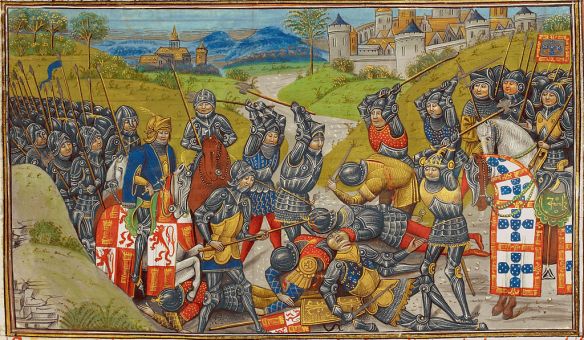
The Battle of Aljubarrota by Jean de Wavrin
War of Portuguese independence. Portugal grew out of Spain, and even when Portugal had emerged as a separate realm, its ruling houses still maintained close Spanish contacts and were very much involved in Spanish politics. Despite these connections, political changes led increasingly to an assertion of Portuguese nationhood totally separate from that of Spain. Two key events played a vital role in this process. One was the coming of the Black Death to Portugal in 1348 (with many subsequent outbreaks), initiating an era of agrarian crisis that undermined and then destroyed the old feudal landed order and turned Portugal into the largely commercial and maritime nation that it has been since. The second was the Portuguese-Castilian War of 1369 to 1385, actually a series of separate wars, which ultimately decided the issue of Portugal’s independence from Spain to Portugal’s advantage.
The war had its origins in a dispute over succession to the throne of Castile. Claimants to the throne included the Portuguese king, D. Fernando I (r. 1367-1383), and Enrique de Trastamara (later Enrique II of Castile, r. 1369-1379), both descended from Sancho IV (r. 1284-1295) of Castile. To advance his cause, Fernando allied himself with Aragon, Castile’s hereditary enemy, and with the Muslim king of Granada. Although most of Portugal was not directly affected by the first war (1369-1371), because Portugal remained the aggressor for the most part, it was nonetheless disastrous for the Portuguese. The peace, however, was not overly severe.
With few of the outstanding issues of the first war resolved, a second (1372-1373) and then a third (1381-1382) followed quickly. Although both were Portuguese wars with Castile, both were also part of the Hundred Years War. Fernando had renounced his claim to the Castilian throne in favor of John of Gaunt, son of the English king Edward III. John was married to an illegitimate daughter of the old Castilian king, who had been assassinated by Enrique in 1369. Enrique allied himself with France. Aragon vacillated between the sides.
This time Portugal was not spared, and central Portugal, as well as the extreme northwest, suffered major Castilian invasions by land and sea. During the second war, much of Lisbon was destroyed by Enrique because the city had outgrown its walls and a large part of it now lay exposed to attack. Fernando’s English allies were nearly as destructive as the Castilians. During the third war, the Portuguese launched a naval counterattack, but the Portuguese fleet was nearly destroyed, and the Spanish returned again by sea to attack Lisbon.
One result of repeated Portuguese disaster was the growing unpopularity of the monarch, D. Fernando, and his consort Leonor Teles de Meneses, who identified closely with Portugal’s great landholders. When D. Fernando died, his legal successor was his daughter D. Beatriz, married to Juan I (r. 1379-1390), king of Castile. The hated Leonor became the regent, and Juan, anxious to assert his claim to Portugal, invaded.
The result was a revolution. The master of Avis, the later Joao I (r. 1385-1433), representing maritime and commercial Portugal, took the lead in the war despite the fact that much of the interior of the country and its landed interests still remained loyal to D. Beatriz. The fortunes of the war varied, but Portugal won a number of important victories, including the Battle of Aljubarrota (1385), on the site now occupied by the Portuguese national cathedral at Batalha, and ultimately forced the Spanish to withdraw. Although the final peace was not signed until 1432 and there were skirmishes as late as 1396-1397, the separateness of Portugal had been established.
References and further reading: Albuquerque, Luis de. Introduçao a Historia dos Descobrimentos Portugueses. 3d rev. ed. Mira Sintra: Publicaçoes Europa-America, n. d. Marques, A. H. de Oliveira. Historia de Portugal. 12th edition, 3 vols. Lisbon: Palas Editores, 1985. Russell, Peter E. The English Intervention in Spain and Portugal in the Time of Edward III and Richard II. Oxford, UK: Oxford University Press, 1965.